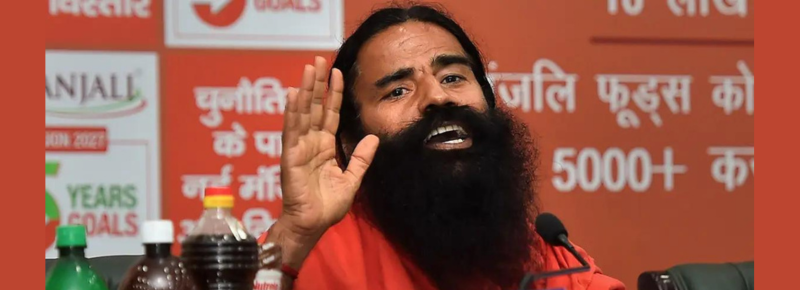Explainer: Why the Supreme Court of India reprimanded Baba Ramdev
Author
Author
- admin / 2 years

- 0
- 4 min read

Author
This is not a debate on “Allopathy vs Ayurveda”, but about finding a realistic solution for the problem of misleading medical advertisements.
When a purported yoga and ayurveda expert, known to ridicule modern medicine, is reprimanded by the highest judicial court in the country, it makes for captivating news headlines. However, it’s only when you dig deeper that you see the festering malady. A society that is grappling with the ceaseless challenges of mis/disinformation related to health.
Recently, the Supreme Court of India delivered a stern reprimand to Patanjali Ayurved, an Indian multinational conglomerate holding company co-founded by Baba Ramdev, for making “false” and “misleading” claims in advertisements about its medicines as cure for several diseases. The court warned the company of potential penalties to the tune of one crore rupees for every false claim made in its advertisements during a hearing on a petition filed by the Indian Medical Association (IMA).
Yet new misleading advertisements continue to be published in leading newspapers. The ads make tall claims, backed by anecdotal experiences, about curing a wide range of ailments, from common cold to autism.
What is the Supreme Court Patanjali case?
IMA filed a petition in 2022 against Patanjali Ayurved for spreading misleading information and conducting a “smear campaign” against modern medicine. The petition was submitted following an advertisement by Patanjali, which sought to “promote traditional medicine by disparaging allopathy”. The IMA contented that there has been a “continuous, systematic, and unabated spread of misinformation” regarding allopathy.
In response to the court’s recent reprimand, Ramdev has alleged a conspiracy by a “gang of doctors” in modern medicine. He accused this group of propagating falsehoods against yoga, ayurveda, naturopathy, and traditional Indian values. Ramdev claimed that synthetic solutions for diseases like blood pressure, diabetes, and others were deliberately discredited by this alleged “gang”.
The court has made it clear that this is not a debate on “Allopathy vs Ayurveda”, but about finding a realistic solution for the problem of misleading medical advertisements. The court has asked the Union Government to find a viable solution for tackling the problem and listed the matter for the next hearing on February 5, 2024.
COVID controversy
This isn’t the first time that the popular traditional medicine advocate has courted controversy. Ramdev is often seen on mainstream news channels and social media platforms talking passionately, albeit with little scientific evidence, about the failings of modern medicine.
In June 2020, Patanjali Ayurved launched Coronil, touted as a COVID-19 treatment, which supposedly had Ayush Ministry certification and WHO approval. Apart from inviting global criticism, there were FIRs filed for alleged counterfeit sales and misleading claims.
Patanjali, under intense scrutiny, referenced a 2020 study on fish, not humans, for Coronil’s efficacy. The study suggested the need for human clinical trials, but couldn’t confirm a cure for COVID-19. Despite these controversies, the product, sold as an “immunity booster”, remained available for online purchase.
In another instance, Ramdev criticised allopathy for being “stupid”. He notoriously claimed that allopathic medicines like remdesivir and favipiravir, approved by the Drugs Controller General of India (DGCI) for COVID-19 treatment, caused more deaths than lack of treatment or oxygen.
In a strong retaliation, IMA filed a case against Patanjali, asserting that the advertisements and claims were misleading, lacked scientific credibility, and had the potential to misguide consumers, especially during a critical health crisis like the COVID-19 pandemic.
Legally speaking
India does not (yet) have a specific law that addresses the issue of medical misinformation. However, several existing laws can help combat the spread of misinformation.
- The Indian Penal Code (IPC) comprises several sections under which culprits who spread misinformation can be prosecuted. For instance, Section 505 (public mischief) and Section 420 (cheating).
- The Information Technology Act, 2000 has provisions that can be used to remove or block access to online content that is deemed to be false or misleading.
- The Drugs and Cosmetics Act, 1940 prohibits the manufacture, sale, or distribution of drugs and cosmetics that are adulterated or misbranded. Offenders can be prosecuted for the spread of misinformation regarding drugs and cosmetics.
In the age of fast-paced information, the dissemination of misleading statements and targeted attacks on evidence-based medicine, particularly by a “guru” with significant following, can sow confusion and erode public trust in the scientific process. While it is healthy to engage in health-related debates and ask pertinent questions about efficacy and risks, making malicious comments, without any evidence, cannot be acceptable.
As a society, we need to step up, stay informed, hone our critical thinking skills, and actively nurture an information ecosystem where facts prevail.










